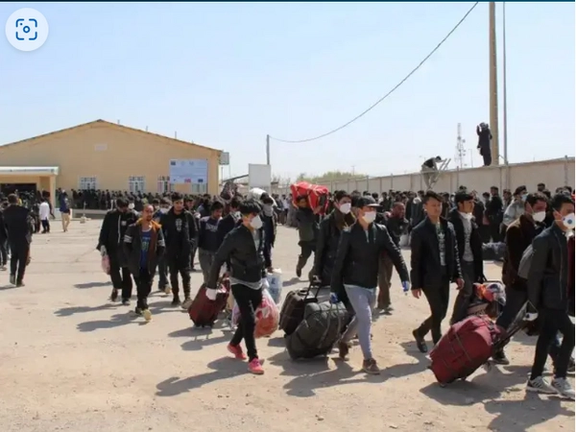Over 540 Iranians Call For End of Persecution of Afghan Immigrants

In a letter, more than 540 Iranian artists, lawyers, doctors, journalists, and civil activists have called for ending the persecution of Afghan immigrants in this country.

In a letter, more than 540 Iranian artists, lawyers, doctors, journalists, and civil activists have called for ending the persecution of Afghan immigrants in this country.
They referred to the forces driving violence, hatred, and discrimination in addressing the immigrant issue as the "regressive elements within Iranian society”.
The signatories highlighted the emergence of an anti-immigrant sentiment targeting Afghans residing in Iran, a trend that gained momentum in the final days of summer.
About 10 days ago, a group of Iranian citizens protested against the presence of Afghan immigrants in Eqbaliyeh city of Qazvin province and attacked their houses.
Some media outlets have warned about the "intensification of the anti-Afghan campaign in Iran”.
Some have referred to it as a “security project” rooted in government figures, aimed at shifting responsibility for issues such as poverty, high prices, and inflation away from the government.
According to the signatories of the statement, those who joined the trend tried to identify immigrants as the cause of the livelihood and security problems in the society by "projecting, exaggerating and publishing false information" and sometimes with "racist" behaviours and speeches.
The statement also stressed on the role of Iranian government in the emergence of such a trend as well as in the 40-year-old problems of Afghan immigrants in Iran.
According to the statement, the lack of accurate statistics on the number of immigrants in Iran has become a pretext for providing false information, fake news, and irrational incitement against the Afghan population living in Iran.
According to reports by the United Nations High Commissioner for Refugees (UNHCR), Afghans comprise six percent of Iran's population.
The statement emphasised that this population alone cannot be attributed as the cause of high prices, inflation, unemployment, exacerbated environmental issues, security concerns, and the “inefficiency of the government" in addressing the national, economic, livelihood, and security crises within the society.
According to them, Afghan immigrants and refugees in Iran are not the only "consumers" of services and have had the "hardest working conditions with the lowest wages" over the past four decades.
It emphasised that Iran's legal system has created obstacles and challenges for the integration of immigrants in the host society.
After more than 40 years, there are first- and second-generation immigrants in Iran who have not yet obtained citizenship.
The government does not issue birth certificates for children born to an Iranian mother and an Afghan father.
Afghan immigrants are facing many challenges such as legal restrictions in the of ownership of movable and immovable property, opening a bank account, buying a SIM card, and registering their children as students in schools.
As per the statement, the government-imposed restrictions have resulted in missed opportunities, and hindered social and class mobility for immigrants, ultimately leading to their systematic marginalisation, increasing their vulnerability and density on the outskirts of big cities.
Ehteram Boroumand, Rakhshan Banietemad, Shahrnush Parsipur, Leila Hatami, Parviz Parastui, Mohsen Renani, Keyvan Samimi, Jila Baniyaghoob, Maqsood Farastkhah, Aliyeh Motallebzadeh, Mostafa Moeen, Badrulsadat Mofidi, Bita Malakouti, Mojtaba Mirtahmasb, Sharmin Meymandi Nejad, Zia Nabavi and Marzieh Vafamehr are some of the signatories of the statement.
They sought drafting and approval of up-to-date and efficient laws and prioritising it in immigration policies, so that the destiny of a large number of Afghan immigrants and refugees in Iran is determined.
The signatories of the statement emphasised that 160 years ago, the people of Iran and Afghanistan were members of one nation and “one land”.
“We will not allow power-seekers and opportunists, whose interests are in divisiveness and xenophobia, to dominate the cultural space of our society and lead this peaceful society astray into violence, hatred, and racism,” they stated.